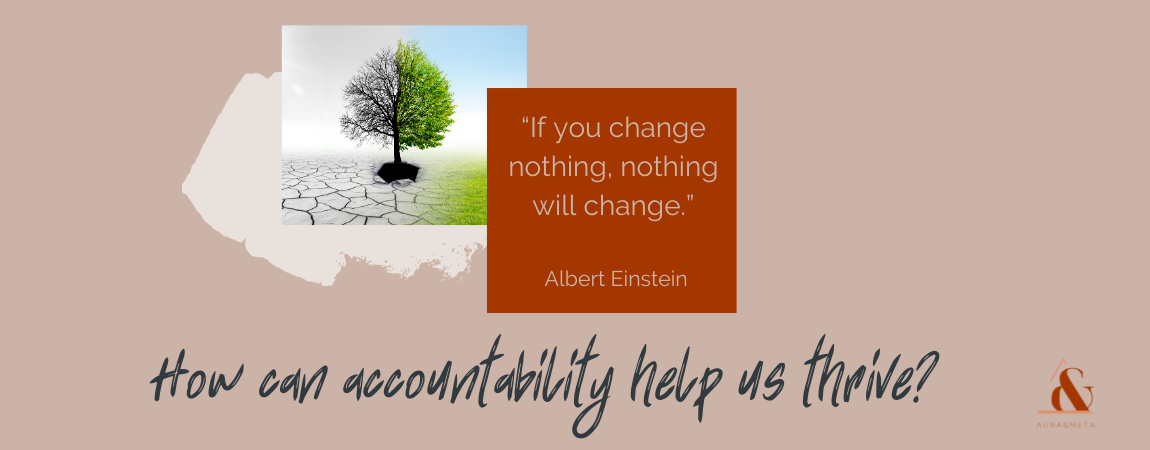Building upon previous concepts we discussed, this week we explore how accountability can help us shift from introspection to taking action. Defining accountability is no easy task, the word may harbour negative connotations for many, as it has often been used in situations gone awry or failures. In reality, accountability forms a harmonious trio with responsibility and integrity. Once we are aligned with our integrity and take responsibility for our actions we become accountable, in success and in failure.
Defining accountability
Accountability is very much linked to our relationship to the outer world. Early on in our lives, our parents, teachers or bosses show us how to be accountable, they direct our actions. When we gain independence, from our family or as an entrepreneur, we become the sole holders of our accountability. We must then learn to look inwards and find the fire that will keep us going. In short, accountability is taking responsibility for your success and following through on promises to yourself. When defining accountability, we can picture a relentlessly renewed commitment to the goals we have set for ourselves.
Accountability as responsibility means understanding that our behaviours have consequences. This mindset keeps us accountable and helps us manage the outcomes of our actions. Behaviours that stem from not taking responsibility betray a lack of accountability. For example, are you constantly justifying the fact that you didn’t accomplish something, or carry out a task you had set for yourself? In this mechanism, known as cognitive dissonance, we are in fact unwilling to face the difference between our reality and our desires. Thus we show how external factors (weather, coworkers, family, pet, etc) are preventing us from taking responsibility.
Our perception of our reality is directly linked to our sense of Self. We all want to believe that we are smart and good people, but sometimes we simply make mistakes, or fail, because we are human. This is a hard blow to our ego and sense of integrity. By taking responsibility for our shortcomings and proactively taking steps to rectify our approach, we may regain the integrity we think we have lost.
Finally, rationalisation may also result from an unwillingness to hold ourselves accountable. Some of us may be very good at talking ourselves out of an unpleasant, difficult or scary task. Finding seemingly logical reasons for not following through creates a diversion that excuses us from undertaking a challenge that stands in our way. This is where accountability involves reconnecting with our dreams and highest potential, by putting more heart in a situation ruled by the mind.
How do we develop accountability in our daily life?
“If you change nothing, nothing will change.” Albert Einstein
As noted previously, lack of accountability might mean distancing ourselves from our responsibilities, perhaps failing to see the bigger picture behind our actions, particularly in the long term. Are you engaging in avoidance or procrastination? These behaviours may signal a lack of accountability. On the contrary, taking action everyday and being able to look back at the progress we have made overtime supports an optimistic and accountable mindset. As a daily practice or a useful tool in challenging times, holding ourselves accountable fosters our ability to bounce back in the face of hardship.
Tune in to our emotions
Holding ourselves accountable revolves as much around action as immobility. Defining accountability for ourselves begins with examining how we perceive the tasks we may be avoiding or struggling to complete. What emotions can you identify when you think about these tasks? As discussed in our previous piece on shifting your mindset, the way we think about something greatly impacts how we act towards it.
Shift towards empowering yourself
From a kinesiology point of view, getting out of a blaming and victimisation culture means we shift towards empowering ourselves rather than finding excuses (justification). Victimisation is not a pretty word and we do not like to be accused of playing the victim. While it may be difficult and painful to recognise it in ourselves, taking a hard cold look at our blaming game may move us into more positive action. Whether it is about having too much on your plate, a habit of people pleasing or a fear of failing, breaking a pattern can only move us closer to success.
Find an accountability partner
From an executive coaching point of view, it may be helpful to challenge ourselves by sharing our action steps with an accountability partner. By voicing our intentions, we add a little extra pressure to follow up on our intentions. If you are the kind of person that does not like to go back on your word, this is a fantastic incentive! Also, discussing your progress with someone every now and then might provide much needed mental validation and clarity. However, this doesn’t necessarily mean our chosen confidant needs to pressure us into doing anything as it is not their job. Finally, beware that your accountability partner does not become a source of negative stress.
Above all, accountability is about committing to ourselves and the changes we would like to bring into our life. There is no better time to do that than now – remember that quote about dancing like nobody’s watching? We beg to disagree: someone is always watching, that person is us, our true Self. Whether you are dancing or finally starting that project you’ve had in mind for the past year, accountability means you are taking responsibility for your own success and finally showing up for your true Self.
Aura & Meta has put together a unique 8-week programme launching this February: Reset, Realign, Restart: STOP existing. START LIVING.
Book here – https://aurameta.com/mind-set-change-rest-realign-restart/
Perhaps your first step towards accountability may be to discuss the changes you wish to see in your life with us at Aura & Meta. Book a free chemistry call to get you started!

